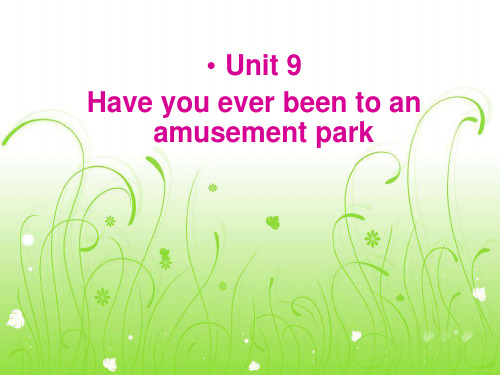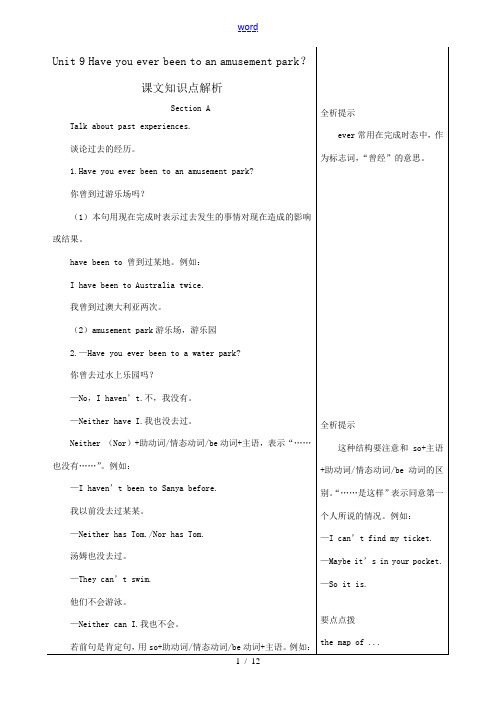英语人教版八年级下册Have you ever been
- 格式:doc
- 大小:83.50 KB
- 文档页数:3


新目标八年级下册Unit 9 Have you ever been to a museum ?讲义一、重点单词1. amusement n. 娱乐; 游戏2. somewhere adv. 在某处; 到某处3. camera n. 照相机; 摄影机; 摄像机4. invention n. 发明物5. invent v. 发明; 创造1. unbelievable adj. 难以置信的; 不真实的2. progress n. 进步; 进展3. rapid adj. 迅速的; 快速的4. unusual adj. 特别的; 不寻常的5. toilet n. 坐便器; 厕所6. encourage v. 鼓励7. social adj. 社会的8. peaceful adj. 和平的; 安宁的9. performance n. 表演; 演出10. perfect adj. 完美的; 完全的11. itself pron.(it的反身代词) 它自己12. collect v. 收集; 采集13. German adj. 德国的; 德语的; 德国人的n. 德语; 德国人14. theme n. 主题15. ride n. 供乘骑的游乐设施; 短途旅程16. province n. 省份17. simply adv. 仅仅; 只; 不过18. fear v. & n. 害怕; 惧怕19. whether conj. 不管......;还是); 或者......(或者); 是否20. Indian adj.印度的 n. 印度人21. Japanese adj.;日本的; 日本人的; 日语的n. 日本人; 日语22. equator n. 赤道23. whenever conj. 在任何......时候; 无论何时24. spring n. 春天25. mostly adv. 主要地; 通常26. location n. 地点; 位置二、短语归纳1.at night在夜晚2.in a more natural environment在一个更加自然的环境中3.all year round 全年4.be far from 离……远5.in the dark 在黑暗中6.in the past 在过去7.have been to sp. 去过某地8.science museum 科学博物馆9.history museum 历史博物馆10.amusement park 游乐园11.go somewhere different 去不同的地方12.go skating 去滑冰13.take the subway 坐地铁14.a great way to spend a Saturday afternoon一个过周六下午的好方法15.all the old movie cameras所有的古老的电影摄影机16.learn about sth.解有关……的情况17.on the weekend 在周末18.camp in the mountains 在大山里露营19.put up a tent搭帐篷20.in such a rapid way 以如此迅猛的方式21.different kinds of各种各样的22.development of toilets 厕所的发展23.social groups 社会团体24.the tea art performances茶艺表演25.make a perfect cup of tea with beautiful tea sets用漂亮的茶具沏一杯完美的茶26.a nice place to enjoy tea 一个品茶的好地方27.thousands of 数以千计的28.International Museum of Toilets国际厕所博物馆29.the Terracotta Army 兵马俑30.Southeast Asia东南亚31.Night Safari 夜间动物园32.three quarters 四分之三33.an English-speaking country一个讲英语的国家34.have problem doing sth. 做某事很困难35.during the daytime在白天36.a couple of times 好几次37.right now 现在;目前38.an amusement park with a special theme一个有特别的主题的游乐园39.walk around the park 在公园里到处走40.hear of 听说41.take a ride兜风42.another province另一个省43.the Bird’s Nest鸟巢44.encourage sb. to do sth.鼓励某人做某事45.on the one hand... on the other hand.一方面,另一方面三、句型集萃1.a great way to do sth一个做某事的好办法2.It’s unbelievable that很难相信……3.watch sb do sth.看某人做了某事4.encourage sb to do sth鼓励某人做某事5.as..as和。

八年级英语·下新目标【人】Unit 9 Have you ever been to a museum?第二课时Section A 2a—2d1.记忆单词和短语:camera,invention,have a great time,put up,take the subway。
2.掌握句型:Have you ever been to a science museum?—I’ve been to the art museum many times.—Me too.—Have you ever been to a history museum?—No,I haven’t.—Me neither.It’s really interesting ,isn’t it?3.掌握含有been,ever和never的现在完成时的用法。
1.学习句型Have you ever been to…?及回答。
2.学习been,ever和never在现在完成时中的运用。
3.就相关话题进行交际教学。
1.含有been,ever和never的现在完成时的用法。
2.一般过去时与现在完成时的区别。
3.听懂参与讨论关于有趣的地方的话题。
本课教学内容是八年级下Unit 9第二课时, 在导入环节,利用一些漂亮的博物馆图片,通过提问,调动学生的积极性,活跃课堂气氛,引入本节讨论的话题,介绍本课的目标句型和单词,在听力环节,注重对学生听力策略的指导,消除学生对听力的“恐惧”心理,让学生能够高效做题。
2d教学是本课综合运用的体现。
通过学习词组、重点句到对话的填空让学生的学习有渐进的过程;抽取学生进行角色扮演,对学生是知识升华的过程。
设计教学PPT,录音机,图片,多媒体。
StepⅠ.Lead in[设计意图]调动学生情感,激活他们头脑中关于过去去过的地方的情感,导入新授。
Leading inT:Boys and girls,do you like traveling?S:Yes.T:Great! Most of you like traveling very much.Me too.Look at the pictures.I went to a lot of places last year.Guess where I went? Use “have/has been to”.S1:You have been to Shanghai.S2:I know you have been to the space museum.S3:You have been to the amusement park.S4:You have been to the zoo.S5:…T:Great! All of you did well.I have been to so many interesting places.Which of these places would you like to visit? Please rank them 1 to 6.space museumhistory museumart museumwater parkzooamusement parkS:…[设计意图]通过情境引入,激发学生情感,便于导入新授内容。



人教版英语八年级下册Unit 9《Have you ever been to a museum》教学设计一. 教材分析人教版英语八年级下册Unit 9《Have you ever been to a museum》主要讨论了人们参观博物馆、公园等地方的经历。
通过本节课的学习,学生能够掌握一般过去时的疑问句和回答,以及描述过去发生的事情。
教材中包含了丰富的图片、对话和练习,有助于激发学生的学习兴趣,提高他们的语言运用能力。
二. 学情分析八年级的学生已经掌握了一般现在时和一般过去时的基本用法,具备一定的听说读写能力。
但部分学生在实际运用中仍存在困难,如疑问句的构成、时态的运用等。
此外,学生的英语学习兴趣和动机有待提高。
三. 教学目标1.知识目标:–学会一般过去时的疑问句和回答;–掌握描述过去发生事情的句型;–了解博物馆、公园等地方的相关词汇。
2.能力目标:–能够用英语询问并描述别人过去的经历;–提高学生的听说读写能力。
3.情感目标:–培养学生对英语学习的兴趣;–培养学生热爱博物馆、公园等公共场所的意识。
四. 教学重难点•一般过去时的疑问句和回答;•描述过去发生事情的句型。
•疑问句的构成和时态的运用;•动词过去式的拼写规则。
五. 教学方法1.情境教学法:通过创设情境,让学生在实际语境中感受和运用英语;2.交际法:鼓励学生参与课堂互动,提高他们的口语表达能力;3.任务型教学法:通过完成任务,培养学生运用英语解决问题的能力;4.游戏教学法:通过趣味游戏,激发学生的学习兴趣。
六. 教学准备1.教学课件:制作课件,包含图片、动画、练习等;2.教学道具:准备相关场所的图片、卡片等;3.音频材料:下载相关听力材料,如录音、歌曲等;4.课堂练习:准备相应的练习题,巩固所学内容。
七. 教学过程1.导入(5分钟)–教师展示一张博物馆的图片,询问学生是否去过博物馆,引导学生谈论自己的经历。
2.呈现(10分钟)–教师展示课件,呈现本节课的主要内容,包括博物馆、公园等地方的词汇以及一般过去时的疑问句和回答。
人教版八年级下册英语第九单元人教版八年级下册英语第九单元的主题是“Have you ever been to a museum?”。
本单元主要围绕参观博物馆的经历展开,涉及一些与博物馆相关的词汇和表达。
重点短语包括:at nightin a more natural environmentall year roundbe far fromin the darkin the pasthave been to spscience museumhistory museumamusement parkgo somewhere differentgo skatingtake the subwaya great way to spend a Saturday afternoonall the old movie cameralearn about sthon the weekendcamp in the mountainsput up a tentin such a rapid waydifferent kinds ofdevelopment of toiletssocial groupsthe tea art performancesmake a perfect cup of tea with beautiful tea sets a nice place to enjoy teathousands ofinternational Museum of Toiletsthe Terracotta Armysoutheast Asianight Safarithree quartersan English-speaking countryhave a problem doing sthduring the daytimea couple of timesright nowan amusement park with a special themeWalk around the parkhear oftake a rideanother provincethe Bird’s Nestencourage sb to do sthon the one hand....on the other hand重点句型包括:Have you ever been to a science museum?Grammar Focus 句子1Have you ever visited the space museum?分数词的表达法whether的用法本单元还涉及一些语法知识,如现在完成时、过去进行时、现在进行时、一般过去时等。
Unit 9 Have You Ever Been to an Amusement Park?一、学习目标:1.掌握现在完成时的用法;2.了解一般过去时、现在完成时和现在完成进行时的意义的区别;3.能够准确使用多种时态谈论自己的经历。
二、学习重点难点:1. 现在完成时由主语+have/has+过去分词构成。
其主要用法如下:I.在未指明具体时间的情况下,现在完成时动词通常可以表示在说话之前已经完成,而后果或影响至今仍存在的动作。
例如:The concert has started. 音乐会已经开始。
I have had breakfast. 我已吃过早饭。
注意:have gone to 和have been to 在意义上有区别。
例如:He has gone to Hong Kong. 他到某某去了。
(他已前往某某,或在途中,或已到达。
说话人暗示他现在不在现场。
)He has been to Hong Kong. 他曾到过某某。
(说话人认为他过去到过某某,现在已不在该地。
言外之意他对某某有所了解。
)II. 现在完成时动词可以表示开始于过去持续到现在(也许还会继续进行下去)的动作或状态。
例如:1) I have studied English since last year. 我从去年开始学习英语。
2) She has lived in Beijing for five years. 她住在已经五年了。
注意:e, go , leave, arrive, buy, lose, receive, join, die, bury 和marry 等动词所表示的动作是一时的,不能延续的,故不能与for …,since …等开头的表示一段时间的状语连用。
不过,这些词用于否定句则可以与表示持续的时间状语连用,即动作的不发生是可以持续的。
例如:不能说:*He has e to Beijing for two years.*He has bought that book for three weeks.*He has joined the Army for one and a half years.*His grandma has died for nine months.* I have received his letter for a month.可以说:He has been in Beijing for two years.He has had that book for three weeks.He has been in the army for one and a half years.His grandma has been dead for nine months.I haven't received his letter for almost a month.或者:It is two years since he came to Beijing.It is three weeks since he bought that book.It is one and a half years since he joined the Army.It is nine months since his grandma died.2. 现在完成时把过去的动作和现在的结果联系起来,一般过去时只限于表示过去的动作本身,与现在的结果无关。
Unit 9 Have you ever been to an amusement park ?68页1.amusement [ u ] 娱乐、消遣an amusement park 游乐场Have you ever been to an amusement park? 你曾经去过一个游乐场吗?Fun Times Amusement Park 欢乐时光游乐场。
复习have been to 去过,回来了have gone to 去了,现在不在这里have been in 去了,还在那里2. neither① adj. pron 二者都不Neither answer is correctNeither of the answers is / are correct.Which do you like? Neither I think they’re both ugly.② adv. 也不I don’t know. Me neither. I don’t know, either.70页3. Disneyland 迪斯尼乐园(前无冠词)Have you ever been to Disneyland?In fact, there are now several different Disneyland amusement parks around the world. 事实上,现在世界上有好几处不同的迪斯尼游乐场。
around the world = all over the worldacross China = all over China4. Mickey Mouse 米老鼠5. Donald Duck 唐老鸭6. character①性格I know his character very well.②汉字Chinese characters③人物、角色famous characters from Chinese historyDisney characters 迪斯尼人物Mickey Mouse and Donald Duck are famous Disney characters.7. seen see的过去分词。
Unit 9Have you ever been to a museum?第四课时SectionB (2a-2d)1.重点单词:thousand,safe,simply,fear,whether,Indian,Japanese,fox,daytime,equator,whenever,spring2.重点词组:thousands of,on the one hand...on the other hand...,three quarters,an English speaking country,take a holiday,during the daytime,all year round3.重点句式:More than three quarters of the population are Chinese.It's also a good place to practice your English.You won't have any problem getting rice,noodles or dumplings.It might seem strange to go to a zoo when it's dark.At the Night Safari,you can watch these animals in a more natural environment than in a normal zoo.The temperature is almost the same all year round.It's not too far from China.1.重点短语和句型2.阅读策略,训练和提高学生的阅读理解能力1.重点短语和句型2.阅读策略,训练和提高学生的阅读理解能力一、预习课本P69-70新单词并背诵,完成下面的汉译英。
1.千____________ 2.安全的____________3.仅仅____________ 4.害怕____________5.还是____________ 6.印度的____________7.日本的____________ 8.狐狸____________9.白天____________ 10.赤道____________11.春天____________ 12.无论何时__________二、认真预习2a-2d内容,找出下列短语和句型。
1 _.数以千计的________________________________________________________________________ 2.超过四分之三的人是华人。
________________________________________________________________________ 3.它也是一个练习英语的好地方。
________________________________________________________________________ 4.你将毫不费力的找到米饭、面条或饺子。
________________________________________________________________________ 5.天黑时去动物园似乎很奇怪。
________________________________________________________________________6.在夜间野生动物园,你能在一种比普通动物园更自然的环境里欣赏动物。
________________________________________________________________________ 7.温度几乎常年是一样的。
________________________________________________________________________ 8.它离中国也不是太远。
________________________________________________________________________Step 1情景导入( Show some pictures of the Teachers in the school to the students)Teacher:Let's guess and talk about whc they are?The students say out the names of the teachers and talk about interesting travelling.(Then show the students pictures about Singapore and ask the students.)Teacher:Which country is it?What is it also called?Have you ever been there before?OK,today we'll read an article about Singapore.We'll learn more about Singapore.环节说明:通过这个环节既复习了国家的名字,同时又提出问题,引出了本节课要学的内容。
Step 2完成教材2a-2c的任务1.利用mind-map,组织4个小组互相交流关于新加坡的风土人情,然后互相说说想了解关于新加坡哪一方面的知识。
(5分钟)2.快速阅读2b 短文,了解短文大意,然后找到文章介绍的参观新加坡的理由。
(3分钟)3.认真阅读短文,用短文中的信息来更正2c中四个句子的错误,完成后请学生说出答案,教师点拨答案。
(5分钟)4.再次细心阅读短文,理解每一句话的意思,小组合作解决遇到的疑难问题。
(5分钟) 5.教师点拨短文中出现的重点和难点。
(5分钟)6.熟读短文,识记并背诵知识要点。
(5分钟)7.小结训练。
(5分钟)(C)1.—What time should I come here tomorrow?—Come________ you like.A.however B.whateverC.whenever D.whoever(A)2.The population of Shanghai ________larger than that of Hong Kong.A.is B.are C. Be D.have(C)3.On ________hand,she is a daughter.On ________hand she is a mother.A.one;other B.the one;anotherC.the one;the other D.one;another(A)4.The population of China ________ large.Four fifths of the population ________ farmers.A.is;are B.are;is C.are;are D.is;be(C)5.It's the best time ________ Beijing in autumn,I think.A.for visit B.to visitingC.to visit D.for visiting(C)6.There are few new words in the article,so you won't have any problem ________it.A.understand B.to understandC.understanding D.understood(A)7.We planted ________ trees last year.A.hundreds of B.hundred ofC.five hundreds D.five hundred of环节说明:通过本环节的学习不仅锻炼了学生的阅读能力,而且通过小结训练让学生对重要知识点进行了巩固练习。
Step 3完成教材2d-2e的任务1.认真阅读2b短文,用短文中的信息来补全2d中的关于新加坡的对话,完成后集体核对答案。
(5分钟)2.两人一组练习对话,并邀请几组学生表演对话。
(5分钟)3.根据所学短文内容,把你记住的有关新加坡的描述写下来,完成后小组内互相交流,比一比谁写得多写得全。
(5分钟)环节说明:通过这个环节的学习让学生对短文有了更深刻地理解;同时也锻炼了学生的口语表达能力和书面表达能力。
Step 4问题探究1. ________ of the warm water ________ already been used up.A.Twothird;has B.Two-third;haveC.Twothirds;has D.Two-thirds;have答案选择C,本题考查分数的表达法和主谓一致。
分数的表示方法为:分子用基数词,分母用序数词;分子大于“一”时,分母用复数,因此排除A和B两项。
本句话的主语为water是不可数名词,谓语动词应该为单数形式即has,所以答案选择C。
2.Thirty percent of the population ______ in the cities.A.live B.lives C.living D.to live答案选择A,population意为“人口数”,它单独做主语时,谓语动词用第三人称单数形式;当分数和百分数修饰population做主语时,谓语动词常用复数形式。
所以答案选择A。
3.—“Food Safety”has become one of the hottest topics recently.—Yeah,it receives ________ Internet hits(点击) a day.A.thousands B.thousand ofC.thousands of D.ten thousands答案选择C,thousand意为“千”,当thousand和具体数字连用的时候不用变成复数;和of 连用的时候要用复数,构成词组thousands of,意为“数以千计的”。
4.We had some problems ________ to the top of the mountain.A.get B.getting C.got D.to get答案选择B,have problems (in) doing sth.表示“做某事很费劲”。